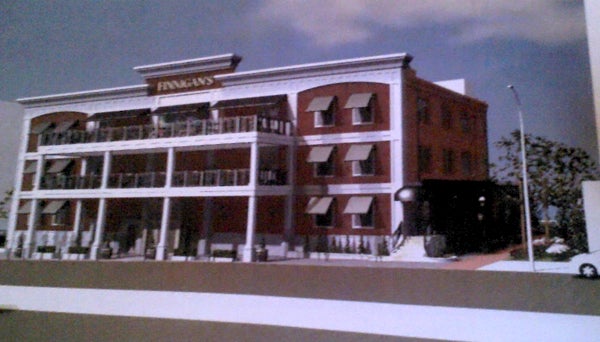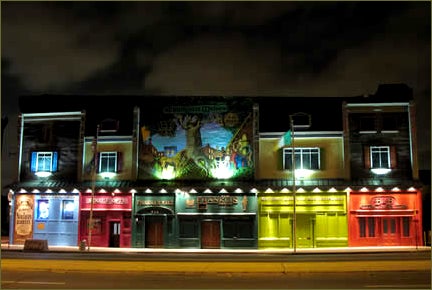City Council returns with a veto override, a code overhaul, and a push for ‘tax fairness’
In its first meeting of the fall legislative session, City Council unanimously voted to override Mayor Michael Nutter’s veto of a bill introduced by First-District Councilman Mark Squilla allowing Finnigan’s Wake, a bar in Northern Liberties, to build balconies over a portion of the Spring Garden Street sidewalk. Nutter vetoed the bill earlier this week, and in a letter to City Council said it was inappropriate give public right-of-way to a private enterprise when the local civic association is opposed.
In this case, the local civic association is the Northern Liberties Neighbors Association, which has opposed specifically the balconies, as well as various earlier iterations of the plan, for some time. On Wednesday, NLNA President Matt Ruben posted to the Northern Liberties message board that Councilman Squilla told him the veto override would take place, and gave a succinct explanation of why that would happen.
Ruben wrote: “As folks may know, whenever a district Council member introduces a bill that impacts only his or her district, the other 16 members traditionally vote for it as a courtesy – and they expect the administration not to veto it, for the same reason. Council has a standing practice of voting a straight 17-0 to override any Mayoral veto of a bill that’s considered a “Councilmanic prerogative” bill, regardless of what’s in the bill. (Which is why Mayors hardly ever veto such bills, and why it was a surprise when Mayor Nutter did so.) … Councilman Squilla also reiterated that as far as he’s concerned, Finnigan’s will not start building anything unless and until they come to an agreement with the community, and both the Bodine and Spring Garden ordinances are amended accordingly.”
In an email to PlanPhilly, Ruben added, “I understand that Council’s override vote was about Councilmanic prerogative and not about what was in this particular bill. But Council should be aware that most people in our community are more concerned with the bill itself, and they really wanted the bill to stay dead.”
Squilla indicated to the Daily News earlier this week that the Mayor’s veto could be considered an “encroachment” on the District Councilperson’s authority.
Councilman Bobby Henon of the 6th District introduced an ordinance overhauling the city’s Property Maintenance Code, in order to “recodify, consolidate, revise, modify, and set forth provisions” for the care of properties in the City. The bill replaces the current Code, which Henon described as being amended ad hoc to the point of incoherence over the last few decades—not unlike the recently updated zoning code—with the 2009 International Property Maintenance Code, customized for Philadelphia.
Henon described the Property Maintenance Code overhaul legislation as an outgrowth of his “Bad Neighbor Initiative,” aimed at identifying property owners and tenants who don’t keep their dwellings up to code.
“[This bill] is a way to make it a little easier and friendlier and put a framework for [L&I] to enforce,” Henon said. He added, “It’s not going to be in legalese terminology; it’s going to be in plain English, so it’s easier for people to read.”
Henon also introduced a resolution, co-sponsored by Councilmembers James Kenney, Bill Green, and María Quiñones-Sánchez, authorizing Council’s Committee of the Whole to hold hearings on “the procedures that the City currently employs to collect delinquent taxes, the effectiveness or shortcomings of those procedures, and the additional measures and resources required to improve the system for collecting delinquent taxes.” The resolution frames the issue as one of restoring public trust in the fairness of Philadelphia’s tax collection system.
Also addressing the issue of “tax fairness,” At-Large Councilman Wilson Goode, Jr., introduced an ordinance amending the real estate tax to shorten the amount of time a newly constructed or improved property can spend under abatement.
Under the current system, property owners pay no tax on the assessable amount of improvement or new construction costs for a full ten years. Goode’s proposal would allow for full abatement in the first year, 80 percent in the second, 60 percent in the third, 40 percent in the fourth, and 20 percent in the fifth year. After five years, the owner would pay the full tax on the assessed value of his or her property.
In introducing the legislation, Goode said that although the ten-year abatement is a “perceived success” in getting people to invest in City property, the complexity of real estate investment decision-making should dictate that the City test the system out. He said the ten-year abatement disproportionately benefits “the few, the new, and the well-to-do,” and the City needs to make sure it isn’t unnecessarily leaving tax revenue on the table.
On behalf of the Nutter Administration, Council President Darrell Clarke introduced an ordinance authorizing Aquinas Realty to build encroachments into the public right-of-way, in the form of projecting bay windows, on its proposed apartment complex at 20th and Chestnut Streets.
Also, as expected, Councilman Curtis Jones introduced on behalf of the Administration the zoning code clean-up bill that was set aside in June. The ordinance approves the Water Department’s hydrology map, which will allow the provision of the zoning code enacting a 50-foot waterfront setback to go into effect.
Contact the reporter at jaredbrey@gmail.com and follow him on Twitter @jaredbrey
WHYY is your source for fact-based, in-depth journalism and information. As a nonprofit organization, we rely on financial support from readers like you. Please give today.








